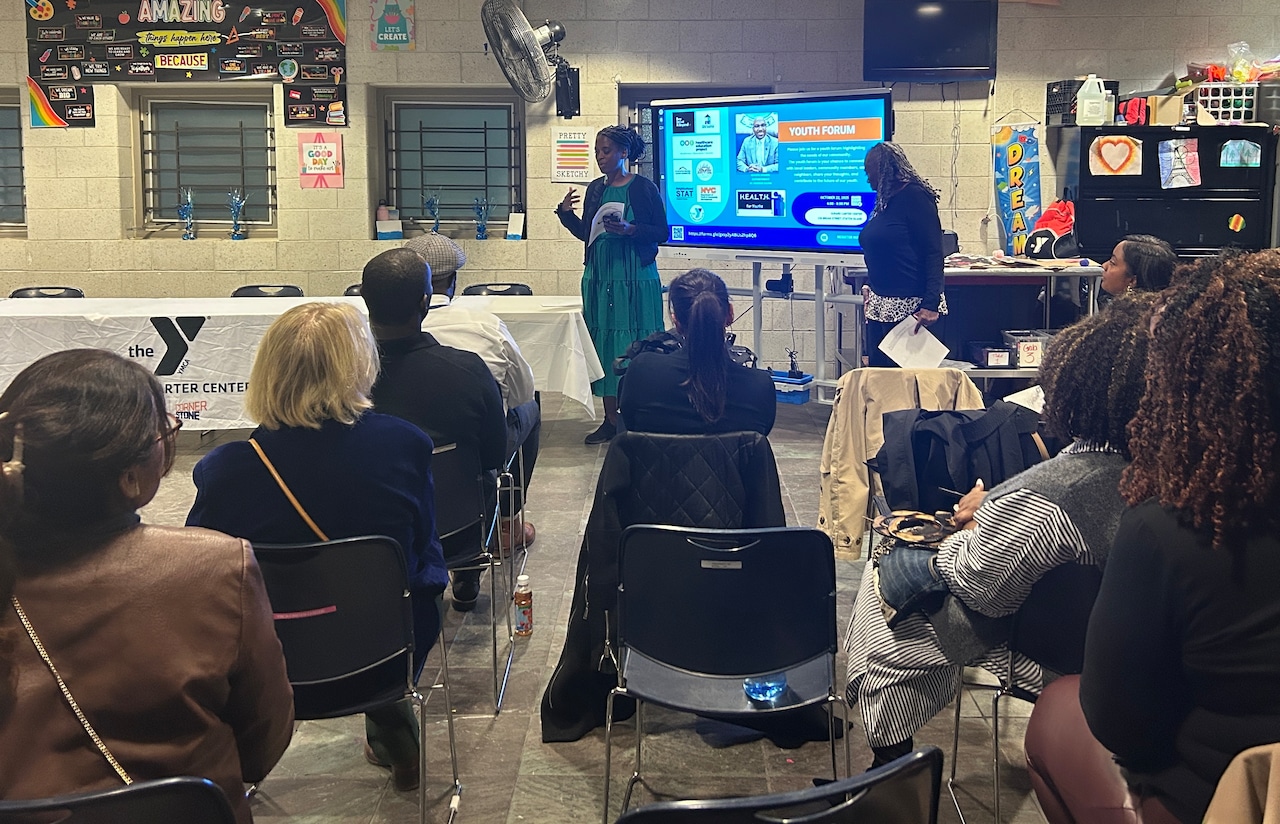STATEN ISLAND, N.Y. — A dynamic youth forum brought together community members, organizations, and local leaders Wednesday night at the Gerard Carter Center in Stapleton to discuss empowerment, opportunity, and the challenges facing Staten Island’s young people.
The event was organized by leaders from H.E.A.L.T.H for Youths, the Central Family Life Center, Bay Street & Beyond, the Stapleton Houses Ad Hoc Committee, the Healthcare Education Project, the Veronica Gambon Project, Neighborhood STAT, the NYC Department of Youth and Community Development, and the Gerard Carter Center YMCA.
Heather Butts, co-founder of the nonprofit H.E.A.L.T.H for Youths, led the event, which aimed to give young people a chance to be heard and discuss the challenges facing Staten Island neighborhoods and beyond.
“It’s important to get people in a room to dialogue with each other and really start to see some of the underlying issues, including the trauma that young people experience in these neighborhoods and others,” Butts said.
The discussion set the stage for Superintendent Dr. Roderick Palton, who oversees Staten Island schools in District 31. Palton has worked with youth throughout his career, including as a former principal for District 75, and has dedicated his career to supporting students.
In his keynote speech, Palton emphasized that connections and relationships, both inside and outside the classroom, are essential for students’ success. Palton also highlighted the district’s intentional strategies to provide students with foundational skills.
“Our approach is very simple: Build that strong foundation,” Palton said.
Such strategies include the Multi-Tiered System of Support (MTSS) and expanded programs across schools, including teaching and business pathways. These initiatives are designed to support young people toward future opportunities.
Panelists Michael Williams, director of program performance at the NYC Office of Neighborhood Safety; Michael DeVito, executive director of the New York Center for Interpersonal Development; Jen Larsen, associate executive director of On Your Mark; Jocelyn Lebron, youth coordinator with the Healthcare Education Project; and Rachel Ullah of True2Life Staten Island.Sydney Maldonado
The forum also featured an open panel with representatives from several local organizations.
Panel members included Michael Williams, director of program performance at the NYC Office of Neighborhood Safety; Rachel Ullah of True2Life Staten Island; Michael DeVito, executive director of the New York Center for Interpersonal Development; Jen Larsen, associate executive director of On Your Mark; and Jocelyn Lebron, youth coordinator with the Healthcare Education Project.
The panelists addressed a range of topics related to supporting Staten Island’s youth, including current challenges, ways to encourage leadership, and new community initiatives.
Challenges facing Staten Island’s youth
Panelists highlighted challenges facing young people today. Ullah noted that young people are often expected to overcome trauma without adequate support, facing pressures at school and beyond. Other issues included the impact of community violence, difficulties socializing with one another, and managing emotions, which DeVito and Lebron linked to constant screen time.
They also discussed ways their organizations are working to address these challenges, highlighting initiatives to meet youth where they are and provide resources and guidance tailored to their needs. They cited programs, such as art competitions to engage students creatively and reduce screen time, therapeutic opportunities, and public speaking visits to schools that inform students and families about future educational and career options.
Empowering young people to lead and get involved
Panelists were asked how local youth can be encouraged to take an active role in their communities.
DeVito noted that while there are many opportunities available, they often go unused because young people aren’t aware of them. He also emphasized the importance of empowering youth to lead and encouraging them to get involved in community efforts.
Panelists highlighted several opportunities for youth to take more active roles in their communities. Programs such as the Summer Youth Employment Program (SYEP) and the evening program at McKee High School were cited as ways to both engage and compensate young people for their time. Panelists also mentioned the importance of providing mental health resources and community support, helping young people feel safe, connected, and motivated to get involved.
Collaboration among organizations
Panelists explained how their organizations collaborate with schools, families, and community stakeholders to support youth well-being.
Larsen said On Your Mark works directly with schools to connect parents and students with programs, such as its Respite Program, which helps guide youth in planning for their futures.
Williams added that the NYC Office of Neighborhood Safety has reinvested and restructured its youth management services initiative, expanding violence intervention and safe passage programs in several schools to ensure students feel supported and protected.
Looking ahead: New initiatives for 2026
Panelists highlighted an array of upcoming programs and partnerships aimed at supporting youth next year.
Williams discussed a roundtable bringing together four partner organizations to coordinate responses to crises and a collaboration with NYCID analyzing shootings over time to address the root causes of community violence.
Larsen shared plans for her organization’s new campus at the New Brighton-based St. Peter & St. Paul’s Elementary School. This will include a day program and a public recreation area with a walking path, pool, and pavilion set to break ground this spring.
DeVito mentioned upcoming after-school enrichment programs, while Ullah highlighted ongoing partnerships and a new podcast to engage local youth. Lebron noted her organization will offer mental health first aid training tailored specifically to youth to help improve emotional well-being.
Butts said she plans to continue these discussions with additional youth forums and conduct long-term community needs assessments to better understand what young people need to succeed.
If you purchase a product or register for an account through a link on our site, we may receive compensation. By using this site, you consent to our User Agreement and agree that your clicks, interactions, and personal information may be collected, recorded, and/or stored by us and social media and other third-party partners in accordance with our Privacy Policy.

